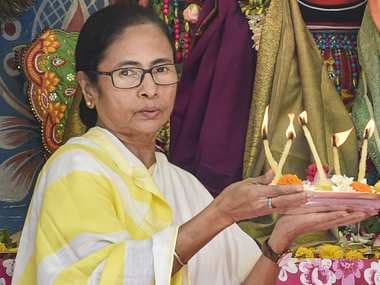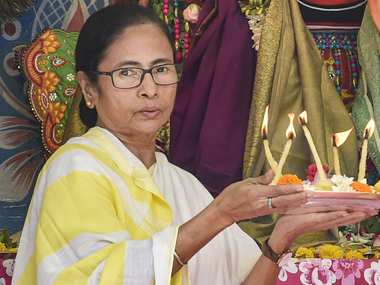The violence, arson and vandalism that continued unabated for more than three days in West Bengal following the enactment of Citizenship Amendment Act (CAA) has got Chief Minister Mamata Banerjee worried, but the blame for this ferocious unrest that resulted in inconvenience for lakhs of people, intimidated many and destroyed private and public property worth crores lies entirely at her door. Violent protests continued even on Sunday as incidents of tyre burning, ransacking of shops, setting fire to logs of wood on thoroughfares were reported from different parts of the state. [caption id=“attachment_6937011” align=“alignleft” width=“380”]  File image of West Bengal chief minister Mamata Banerjee. PTI[/caption] These are nothing, however, compared to the absolute mayhem that Bengal witnessed on Friday and Saturday when scores of buses were burnt, many trains set alight and frenzied mobs burnt down toll plazas, set ablaze railway stations, tracks, destructed station master’s offices and made away with loot. The protests, that were seemingly against the CAA, soon became an excuse for plundering and ransacking. More than Rs 17 lakh was looted from one toll plaza, while for the Indian Railways — the chief target of attacks — the damage was worth several crores as its properties were either destroyed or looted.
Situation looks grim in Bengal. Two railway stations— in Malda and North 24 Paraganas— vandalised, and then set on fire. At least 3 toll plazas ransacked, 17 lakh looted from one plaza, claims @NHAISocialmedia. Crores lost, NHAI writes to state govt for security. #AntiCAAProtests
— Madhuparna (@madhuparna_N) December 15, 2019
At the height of the mayhem, 78 trains, including 28 express trains, were cancelled by the South Eastern Railway, while around 39 trains were either rescheduled or diverted in the arterial Sealdah and Howrah sections. Commuters were stuck, some on social media recounted horror stories of intimidation by mobs while the daily routine of millions was throw into chaos. So fearless was the mob and so helpless the police that in the rare occasions when the paralysed law and order machinery attempted to restore some order, they received a vicious blow back. It was as if for nearly 72 hours, Bengal witnessed a free-for-all as the state government seemingly abdicated all its responsibilities.
Police attacked at Uluberia in West Bengal, on Sunday, after cops went to arrest those accused of vandalism at the local station during #AntiCAA protests. Inspector-in-charge injured. Police vehicle torched by accused. @ThePrintIndia
— Madhuparna (@madhuparna_N) December 15, 2019
Mamata is a strict disciplinarian, hard taskmaster and a tough administrator. She wields absolute power over the state. It is not inconceivable that had she acted with alacrity and an iron hand, the situation wouldn’t have gone out of control. The immediate question that needs answering is this: Why didn’t she act sooner?
Murshidabad: Several trains that were static at the Krishnapur railway station near Lalgola have been set on fire by anti-CAB protesters pic.twitter.com/zMEIrCRgVz
— Indrajit Kundu | ইন্দ্রজিৎ (@iindrojit) December 14, 2019
This is Sujnipara railway station under Malda division of @EasternRailway
— Indrajit Kundu | ইন্দ্রজিৎ (@iindrojit) December 14, 2019
Here too, the station has been openly vandalised by protesters today. Complete free for all in Murshidabad pic.twitter.com/S1kD8Dep5h
Impact Shorts
More ShortsTo find an answer to that question, we may turn our attention to a tweet posted by Congress leader from Assam Gaurav Gogoi: “Given the state of nationwide protests in the aftermath of Citizenship Amendment Act, will it not be wise to repeal this controversial immediately? The economy is tanking, prices are rising and joblessness is increasing. Will PM Modi and HM Amit Shah understand the gravity? Mamata’s stance against the CAA and National Register of Citizens (NRC) is clear. She has risked a constitutional crisis and violation of Article 256 of the Indian Constitution by declaring that she won’t allow CAA or NRC in the state. The mass protests in Assam and other northeastern states provided Mamata with a template. If Bengal, too, breaks out into similar protests as have been witnessed in Assam, then perhaps the Central government could be pressurized into withdrawing a law that may queer Mamata’s electoral pitch. But the Bengal chief minister made two crucial errors. One, she miscalculated on the scale of protest in Bengal. The nature of the protests in Assam and Bengal over the CAA is not the same. Though clubbing the protests may serve a political purpose for some, in reality Assam’s protest is more organic and its flows from an existential fear that a massive influx of infiltrators from Bangladesh will forever alter the state’s demography and make the ethnic, indigenous people a minority in their own state. The ethnic population in Assam who speak Assamese, therefore, are unwilling to let the state host any more Bengali-speaking refugees be it Hindu, Muslim, Sikhs, Christians or any other community regardless of whether they have been forced to flee to India to avoid religious persecution, or have infiltrated due to economic reasons. They are up in arms against the CAA because it now legalizes the mostly Hindu Bengali settlers (who migrated before December 2014) and gives them citizenship status. In other words, the key motivation behind the protests in Assam is exclusionary. Whereas in Bengal, the state government and the ruling party are against the CAA because it seemingly makes a distinction between the refugees based on their religion. The CAA promises to provide expedited citizenship to members of six communities who have faced religious persecution in the Islamic states of Afghanistan, Pakistan and Bangladesh whereas it offers no such special provision to Muslim settlers because the criterion of religious persecution doesn’t apply to them. So, the fundamental motivation behind the protests in Bengal against CAA is inclusionary. This is also why other Indian states cannot appropriate the struggle that is under way against CAA in Assam and North East. Mamata’s second error was laxity in upholding law and order when trouble broke out in the state on Friday. The state government in Assam, in contrast, was prompt in taking action and implementing the rule of law despite being faced with a more spontaneous protest. Citizens in Assam too pelted stones and valdalised public properties, but the administration clamped curfew in Guwahati and Dibrugarh, suspended mobile internet services for 24 hours and called in the army. By Monday, the Assam Police arrested 175 and detained 1,460 for indulging in violent agitations. The state now feels confident enough to relax the curfew in Guwahati and Dibrugarh. While the protests may certainly continue, the violent aspects have been controlled. In contrast, the state administration in Bengal was conspicuous by its absence. As violence spread in different parts of the state and reports of widespread arson, vandalism and willful destruction of public property came in, not a single rioter was arrested, no curfew was imposed and the police, instead of rounding up the culprits, were found scurrying for cover.
Murshidabad: Not just vehicles, even RPF personnel were attacked. Thrashed by protesters, atleast 3 injured RPF jawans have been admitted in hospital pic.twitter.com/tGVQYpuns1
— Indrajit Kundu | ইন্দ্রজিৎ (@iindrojit) December 15, 2019
Murshidabad: Railway Protection Force (RPF) vehicle set on fire by anti-CAB protesters in Rejinagar today. Atleast four RPF vehicles burnt down in Rejinagar and Sagardighi pic.twitter.com/ucYNgFfovG
— Indrajit Kundu | ইন্দ্রজিৎ (@iindrojit) December 15, 2019
The situation went out of hand so quickly that the chief minister issued anappeal for the state to remain calm.
But the time for “appeal” was long past. The state government needed to act decisively to stop the vandalism and arrest the goons responsible for arson and violence. And yet her failure to do so adequately explains the predicament that the chief minister finds herself in over the CAA. Her propensity for vote bank politics has put her in such a tight corner that she cannot be seen taking legitimate action against arsonists lest it upsets her vote bank. On the other hand, the violence and vandalism are clearly affecting public opinion and may soon result in a counter-consolidation benefitting the BJP. Caught between a rock and a hard place, Mamata has little option except “appeal for calm”. Her fear found expression in West Bengal urban development minister and Kolkata mayor Firhad “Bobby” Hakim’s words when he was quoted, as saying that “such violent protests will not help the state but will only strengthen the hands of the BJP.” For a while, the TMC government tried to justify the vandalism and violence as “democratic dissent” but quickly realized that the situation is becoming counter-productive to its own interests. Right now, the administration has arranged for a series of public engagements including a “protest march” against the CAA and NRC in the heart of the city on Monday and advertisements in media against the dual moves. But Mamata’s space of political manoeuvering is limited. She has ended up squeezing her own options by letting violence continue. CAA and its aftermath could be a game-changer in Bengal.


)

)
)
)
)
)
)
)
)



